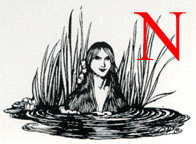 O doubt all knowledge is good, and will
eventually prove serviceable to the world.
But, speaking for myself—if I had been consulted first—if it had rested with me to decide
—I think I should have voted against the
invention of the electric telegraph. It appears
to me that the electric telegraph chiefly serves
to convey the news of misfortune rapidly, inaccurately, abruptly, and partially. We have now
the fifth act of the tragedy before we know
anything of the preceding ones. Then, again,
the system of telegraphing tends more and more to divide official men into two classes—idiots and
madmen. The facility for conveying concentrated information and asking for immediate instructions, gradually dwarfs the mental powers
and activity of the subordinate in the distance;
while the principal man at home is driven into
madness by never having a sure moment of
peace. [39-40]
O doubt all knowledge is good, and will
eventually prove serviceable to the world.
But, speaking for myself—if I had been consulted first—if it had rested with me to decide
—I think I should have voted against the
invention of the electric telegraph. It appears
to me that the electric telegraph chiefly serves
to convey the news of misfortune rapidly, inaccurately, abruptly, and partially. We have now
the fifth act of the tragedy before we know
anything of the preceding ones. Then, again,
the system of telegraphing tends more and more to divide official men into two classes—idiots and
madmen. The facility for conveying concentrated information and asking for immediate instructions, gradually dwarfs the mental powers
and activity of the subordinate in the distance;
while the principal man at home is driven into
madness by never having a sure moment of
peace. [39-40]
Bibliography
[Helps, Sir Arthur]. Brevia: Short Essays and Aphorisms by the Author of “Friends in Council”. Boston: Roberts Brothers, 1871. The reverse of the title page has the following: “Chiswick Press: — printed by Whittingham and Wilkins, Tooks Court, Chancery Lane [London].”
Last modified 5 December 2011